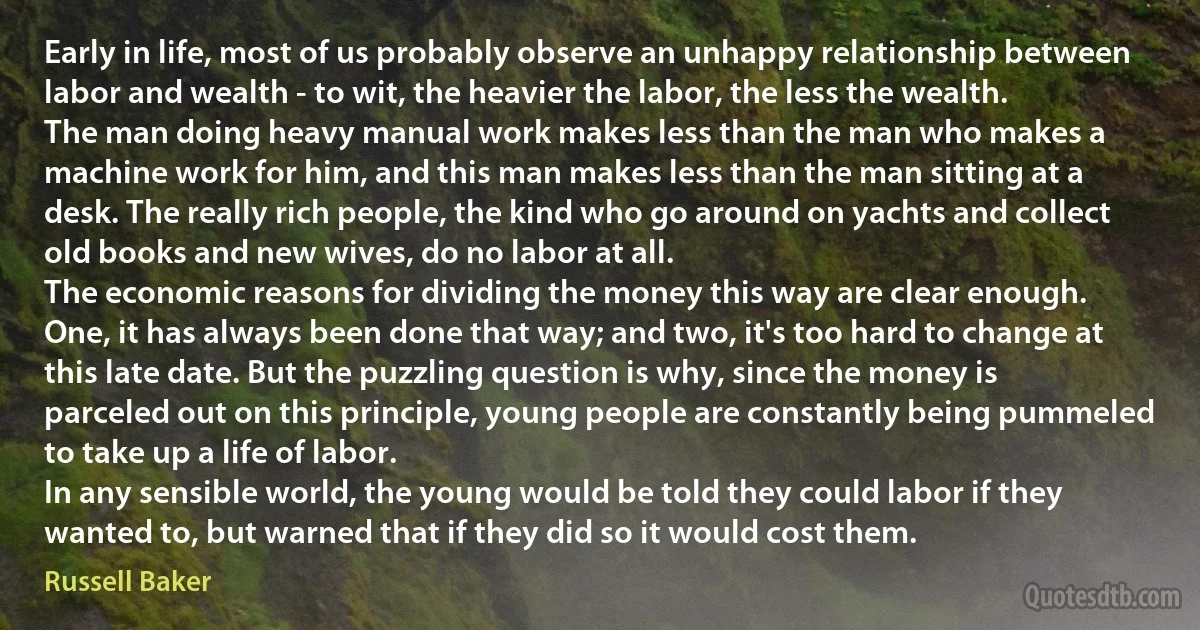
Early in life, most of us probably observe an unhappy relationship between labor and wealth - to wit, the heavier the labor, the less the wealth. The man doing heavy manual work makes less than the man who makes a machine work for him, and this man makes less than the man sitting at a desk. The really rich people, the kind who go around on yachts and collect old books and new wives, do no labor at all. The economic reasons for dividing the money this way are clear enough. One, it has always been done that way; and two, it's too hard to change at this late date. But the puzzling question is why, since the money is parceled out on this principle, young people are constantly being pummeled to take up a life of labor. In any sensible world, the young would be told they could labor if they wanted to, but warned that if they did so it would cost them.
Russell BakerRelated topics
change clear collect cost desk done early enough hard heavy kind labor late less life man money observe people puzzling question rich sitting take tell unhappy way wealth wives wit work world youngRelated quotes
... a rather different class of applications of the idea of best allocation of scarce resources... usually referred to as the theory of optimal economic growth. In most studies of this kind made in the countries with market economies there is not an identifiable client to whom the findings are submitted as policy recommendations. Nor is there an obvious choice of objective function, such as cost minimization or profit maximization in the studies addressed to individual enterprises. The field has more of a speculative character. The models studied usually contain only a few highly aggregated variables. One considers alternative objective functions that incorporate or emphasize various strands of ethical, political, or social thought. These objectives are then tried out to see what future paths of the economy they imply under equally simplified assumptions of technology or resource availability.

Tjalling Koopmans
There are cynics who deny the existence of human gratitude. But it seems that I am no cynic. So convinced am I of the existence of gratitude that I see in it one of our strongest oppositions. There are millions of persons who receive favors that they forget: but gratitude does exist, and they've got to express it somewhere. They take it out by being grateful to science for all that science has done for them, a gratitude, which, according to their dull perceptions won't cost them anything. So there is economic indignation against anybody who is disagreeable to science. He is trying to rob the people of a cheap gratitude.
I like a bargain as well as does anybody else, but I can't save expenses by being grateful to Science, if for every scientist who has perhaps been of benefit to me, there have been many other scientists who have tried to strangle that possible benefit.

Charles Fort
Returning to the moon is an important step for our space program. Establishing an extended human presence on the moon could vastly reduce the costs of further space exploration, making possible ever more ambitious missions. Lifting heavy spacecraft and fuel out of the Earth's gravity is expensive. Spacecraft assembled and provisioned on the moon could escape its far lower gravity using far less energy, and thus, far less cost. Also, the moon is home to abundant resources. Its soil contains raw materials that might be harvested and processed into rocket fuel or breathable air. We can use our time on the moon to develop and test new approaches and technologies and systems that will allow us to function in other, more challenging environments. The moon is a logical step toward further progress and achievement.

George W. Bush
I gave up on this stuff. I gave up on my species and ... I gave up on my countrymen. Because I think we squandered great gifts. I think humans were given great great gifts: walking upright, binocular vision, opposable thumb, large brain ... We grew. We had great gifts, and we gave it all up for both money and God ... We gave it all up to superstition, primitive superstition, primitive shit ... Invisible man in the sky, looking down, keeping track of what we do, make sure we don't do the wrong thing, if we do, he puts us in hell, where we burn forever. That kind of shit is very limiting for this brain we have. So we keep ourselves limited. And then we want a toy and a gizmo and gold and we want shiny things, and we want something to plug in that will make big big big things for us... And all that shit is nothing! It's nothing.

George Carlin
On the 26th of January 1950, we are going to enter into a life of contradictions. In politics we will have equality and in social and economic life we will have inequality. In politics we will be recognizing the principle of one man one vote and one vote one value. In our social and economic life, we shall, by reason of our social and economic structure, continue to deny the principle of one man one value. How long shall we continue to live this life of contradictions? How long shall we continue to deny equality in our social and economic life? If we continue to deny it for long, we will do so only by putting our political democracy in peril. We must remove this contradiction at the earliest possible moment or else those who suffer from inequality will blow up the structure of political democracy which is Assembly has to laboriously built up.”.

Bhimrao Ramji Ambedkar
